Are you tired of spending a lot on fuel? The cost of living in South Africa is rising. That’s why fuel-efficient cars are a great choice. If you’re looking for a new car, you might wonder about the best fuel-saving options under R100,000.
Fuel-efficient cars, like affordable eco-friendly cars, can save you money. They are perfect for those looking to cut down on fuel costs. In this article, we’ll explore the best fuel-saving cars under R100,000. We’ll look at their features, benefits, and what’s available in the market.
Key Takeaways
- Best fuel-saving cars under R100,000 can help you save money on fuel costs
- Fuel-efficient vehicles, such as affordable eco-friendly cars, are a great option for South African drivers
- Compact hatchbacks and entry-level sedans are popular choices for fuel-efficient cars
- Affordable eco-friendly cars can make a significant difference in your budget
- Fuel-efficient vehicles are a great way to reduce your carbon footprint
- Researching and comparing different models can help you find the best fuel-saving car for your needs
Understanding Fuel Efficiency in Modern Budget Cars
Fuel efficiency is key in top budget-friendly eco cars. These cars help lower your carbon footprint and save money on fuel. In South Africa, where fuel is expensive, a fuel-efficient car can really help your budget.
So, what makes a car fuel efficient? It’s about the car’s weight, engine size, and how it moves through the air. Lighter cars with smaller engines use less energy. Features like automatic start/stop and regenerative braking also help.
Many budget-friendly eco cars are now very fuel efficient. For example, the Toyota Prius has a hybrid engine that mixes a petrol engine with an electric motor. This makes it very fuel-efficient. Other cars like the Honda Fit and Ford Fiesta also offer great fuel efficiency without costing too much.
Key Features of Fuel-Efficient Cars
- Lightweight materials
- Smaller engine sizes
- Aerodynamic design
- Automatic start/stop technology
- Regenerative braking
Choosing an economical fuel-efficient car can save you a lot on fuel costs. It also helps the environment. Whether you’re driving to work or on a trip, a fuel-efficient car makes you feel good.
The South African Market for Budget-Friendly Fuel Savers
The need for best value eco-friendly vehicles under r100k is growing in South Africa. This is due to higher fuel prices and more people caring about the environment. Many are choosing cars that save fuel and are good for the planet.
Popular choices include compact hatchbacks and entry-level sedans. These cars are affordable and use less fuel. They are perfect for those watching their budget.
Several factors are driving the demand for fuel-efficient cars in South Africa:
- Fuel prices: Rising fuel costs have made people look for cars that use less fuel.
- Environmental concerns: Buyers are now thinking about how their cars affect the environment. They’re choosing eco-friendly options.
- Affordability: Best value eco-friendly vehicles under r100k are gaining popularity. They offer great value for the money.
Recent data shows the market for best value eco-friendly vehicles under r100k in South Africa is set to grow. As more people see the benefits of fuel-efficient cars, demand will likely rise.
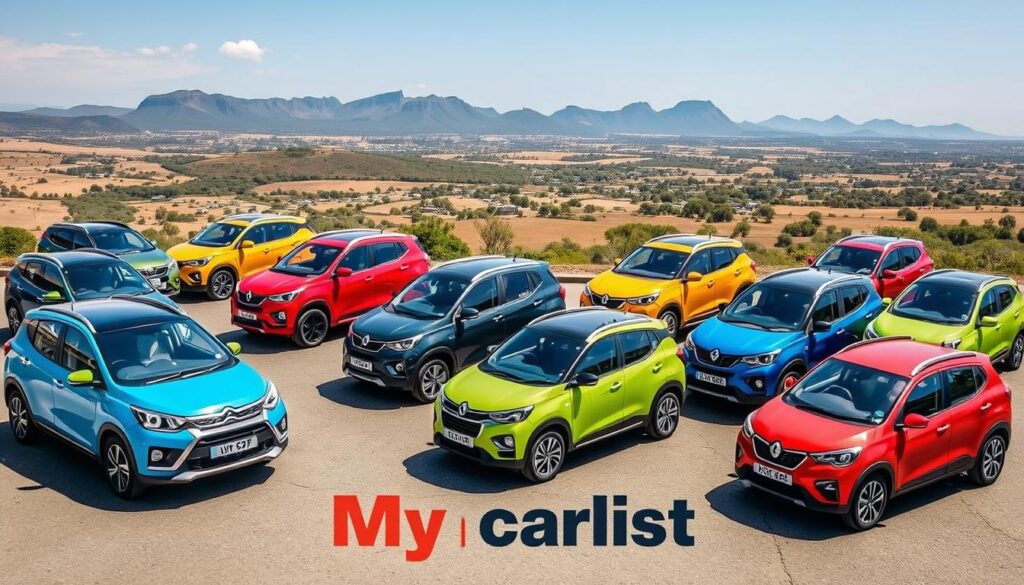
Best Fuel-Saving Cars Under R100,000 in South Africa
In South Africa, finding cars that save on fuel and are affordable is easy. The best cars under R100,000 are a mix of cost, fuel efficiency, and features. We’ll look at top models in hatchbacks, sedans, and urban cars.
These cars are great for daily drives and offer good value. With fuel prices going up, a fuel-efficient car saves money over time. Look for fuel-efficient engines, aerodynamic design, and advanced technology to cut down fuel use.
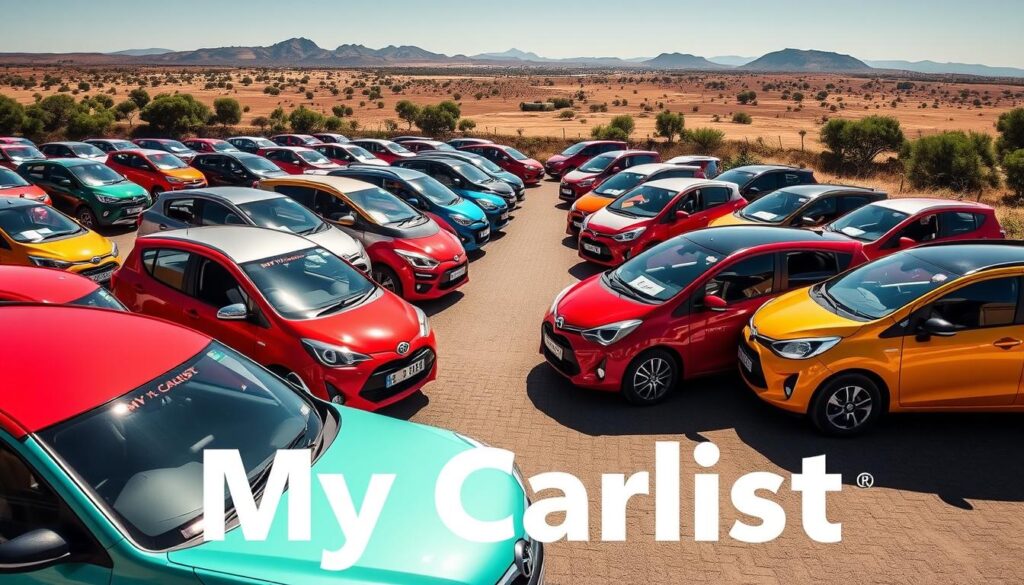
- Compact Hatchbacks: Toyota Etios, Volkswagen Polo
- Entry-Level Sedans: Ford Figo, Kia Rio
- Urban Commuters: Honda Brio, Nissan Micra
These cars have many benefits. They’re cheap to run, easy on the wallet, and packed with features. You’ll find Bluetooth, touchscreen systems, and more.
| Car Model | Fuel Efficiency (l/100km) | Price (R) |
|---|---|---|
| Toyota Etios | 5.5 | 90,000 |
| Volkswagen Polo | 5.8 | 95,000 |
| Ford Figo | 6.1 | 85,000 |
Choosing one of these cars saves money on fuel and helps the environment. They’re perfect for new buyers or those upgrading. These models are definitely worth a look.
Key Features to Look for in Economical Vehicles
When looking for fuel-efficient vehicles, it’s key to check a few important features. These include the engine type, transmission, and how aerodynamic the car is. Affordable eco-friendly cars often have tech that helps save fuel, like start-stop systems and regenerative braking.
Choosing the right fuel-efficient vehicle requires careful thought. Think about how you drive, the roads you’ll be on, and the cost of upkeep. For example, a car with a smaller engine and automatic transmission might be best if you mostly drive in the city.
Here are some features to look for in affordable eco-friendly cars:
- Low rolling resistance tires
- Aerodynamic design
- Advanced engine technologies
- Regenerative braking systems
By looking at these features and doing your homework, you can find the right fuel-efficient vehicle for you. Don’t forget to think about the long-term costs, like maintenance and fuel, to make a smart choice.
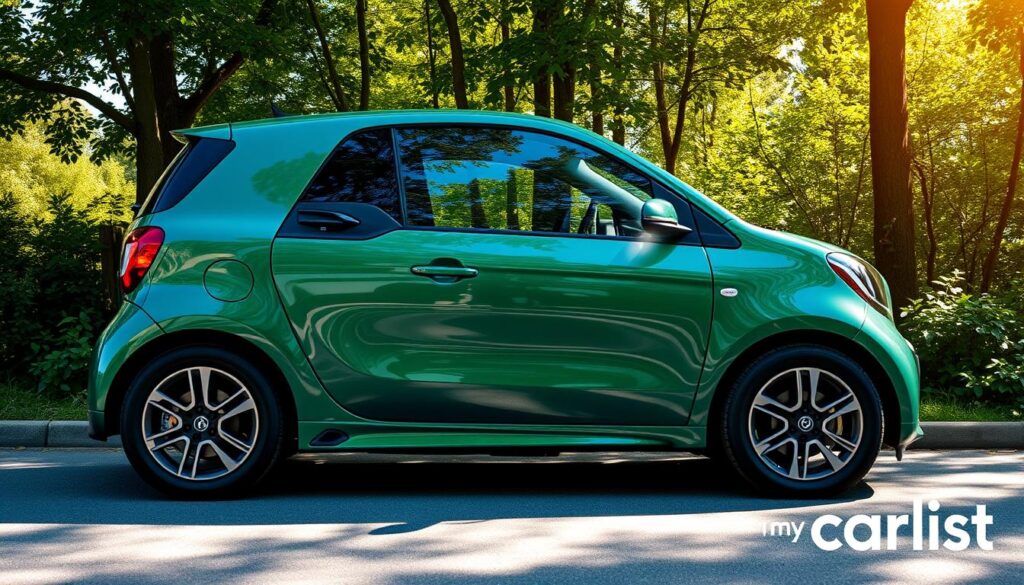
Maintenance Costs and Long-Term Savings
When you own economical fuel-efficient cars, think about maintenance costs and savings. Regular checks are key to keep your car running well. This helps save money in the long run.
Some eco-friendly cars under r100k need less service, saving you money. It’s smart to know what maintenance a car needs before buying it.
Regular Service Requirements
For economical cars, you’ll need to change oil, rotate tires, and replace brake pads. These steps prevent expensive repairs later on.
Parts Availability and Costs
Parts prices and availability change with the car’s make and model. But, many makers of fuel-efficient cars offer affordable parts. This can lower your maintenance costs.
Insurance Considerations
Insurance is another important thing for economical cars. Some insurers give discounts for green cars. This can lower your insurance costs.
Real-World Fuel Consumption Statistics
When looking at best fuel-saving cars under R100,000, knowing real-world fuel use is key. Cars that use less fuel can save you money. Your driving habits, road conditions, and weather also play a part in fuel use.
In South Africa, fuel use varies by car and driving conditions. For example, cars like the Toyota Etios or the Volkswagen Polo use less fuel. They are great for daily drives.
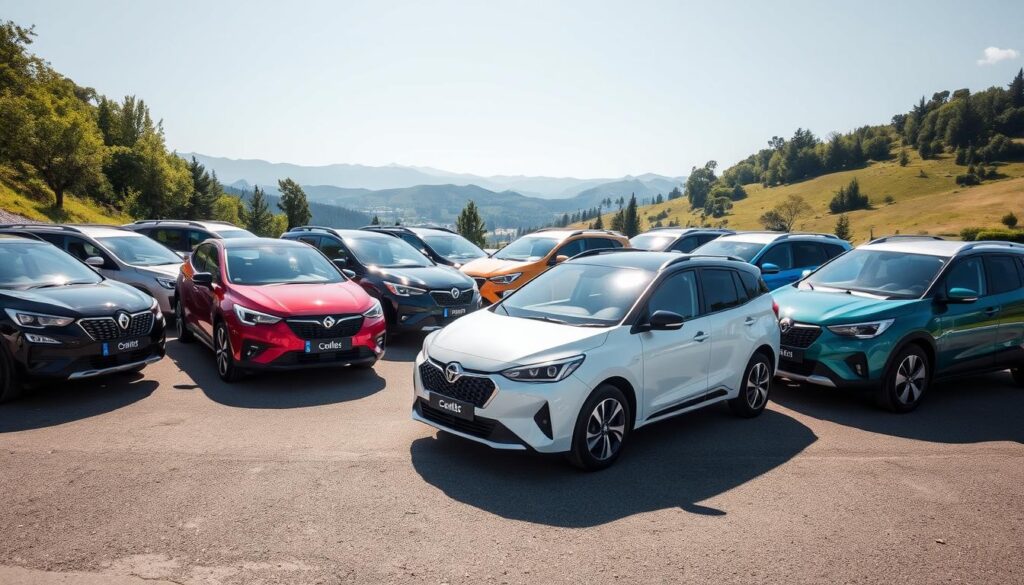
Here are some important stats for best fuel-saving cars under R100,000:
- Average fuel consumption for compact hatchbacks: 6-8 liters per 100 kilometers
- Average fuel consumption for entry-level sedans: 7-9 liters per 100 kilometers
- Average fuel consumption for urban commuters: 5-7 liters per 100 kilometers
By looking at these stats and factors, you can choose a fuel-efficient vehicle that fits your needs and budget. Always research and compare different models. This will help you find the best car for your lifestyle and driving habits.
| Vehicle Type | Average Fuel Consumption (liters/100km) |
|---|---|
| Compact Hatchbacks | 6-8 |
| Entry-Level Sedans | 7-9 |
| Urban Commuters | 5-7 |
Environmental Impact and Emissions Standards
Choosing a fuel-efficient car means looking at the environmental impact and emissions standards. Top budget-friendly eco cars help reduce greenhouse gas emissions and air pollution. This makes them a great choice for those who want to lower their carbon footprint. In South Africa, there are rules to make sure cars meet certain emissions standards. This has made affordable eco-friendly cars more popular.
Fuel-efficient cars have many benefits. They cut down on carbon emissions, use less fuel, and reduce air pollution. By picking a top budget-friendly eco car, you help the environment and save on fuel costs. Here are some key features to look for in an eco-friendly vehicle:
- Low emissions rating
- Good fuel economy
- Eco-friendly materials used in production
Affordable eco-friendly cars are now more accessible to everyone. Many manufacturers offer eco-friendly models. This makes it a great time to switch to a more sustainable vehicle. 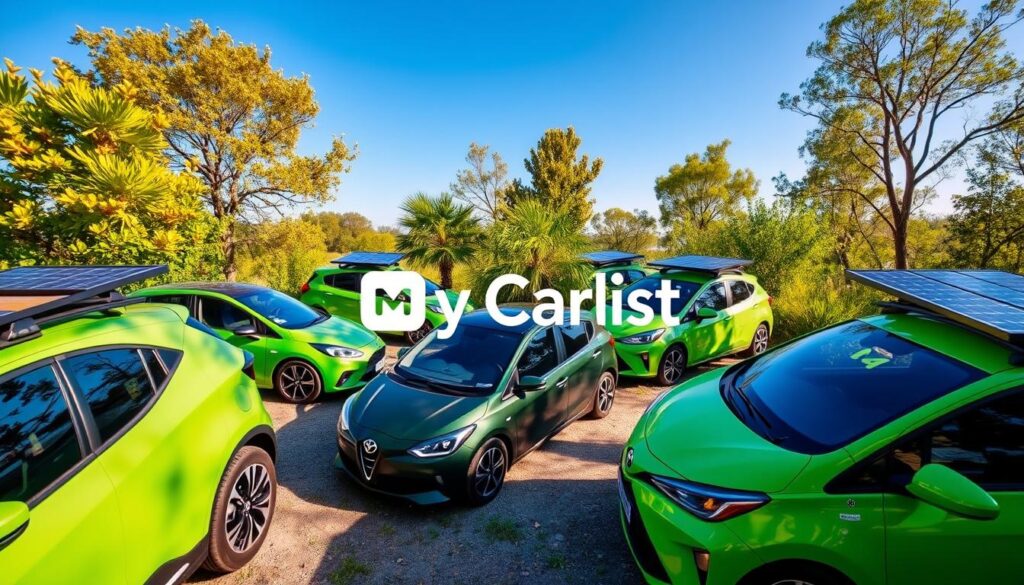
Carbon Footprint Considerations
Thinking about a vehicle’s carbon footprint is crucial. Top budget-friendly eco cars aim to reduce carbon emissions. By choosing an affordable eco-friendly car, you help make the environment cleaner and reduce greenhouse gas emissions.
Emission Regulations in South Africa
In South Africa, there are rules to control vehicle emissions. The government has set measures to lower emissions and encourage eco-friendly vehicles. By picking a top budget-friendly eco car, you meet emissions standards and help the environment.
| Vehicle Type | Emissions Rating | Fuel Economy |
|---|---|---|
| Top budget-friendly eco car | Low | Good |
| Affordable eco-friendly car | Medium | Fair |
Financing Options for Budget-Friendly Eco Cars
When you’re looking at eco-friendly cars under R100k, financing matters a lot. Many in South Africa want fuel-saving cars but finding the right loan is hard. We’ll look at bank loans and dealer financing to help you choose wisely.
Getting a fuel-efficient car can save you money. But picking the right loan is key. Bank loans and dealer financing have their good and bad sides. Think about interest rates, how long you’ll pay, and your monthly costs.
Bank Loans vs. Dealer Financing
Bank loans often have better rates and terms. Dealer financing is easy but check the details. Make sure you’re getting the best deal.
Monthly Payment Calculations
To pick the right loan, figure out your monthly payments. Use the car’s price, interest rate, and how long you’ll pay to find out. For example, a R80,000 car with 10% interest over 60 months costs about R1,700 a month.
By looking at your loan options and monthly payments, you can choose well. Then, you can drive off in your new eco-friendly car, saving on fuel costs.
Common Myths About Fuel-Efficient Cars
There are many wrong ideas about fuel-efficient vehicles. Some think they cost too much and aren’t worth it. But, many economical fuel-efficient cars are affordable and offer great value.
Some believe fuel-efficient cars are slow and lack power. But, new technology has made them fast and powerful. Here are some common myths:
- They are more expensive to maintain
- They are not suitable for long road trips
- They are not environmentally friendly
In truth, fuel-efficient vehicles save money over time. They use less fuel and cost less to keep up. They’re also good for long trips, offering a smooth ride. Plus, they’re good for the planet, making fewer emissions.
Knowing the truth can help buyers choose the right fuel-efficient vehicle. With more people wanting economical fuel-efficient cars, there’s a wide range of options. They meet different needs and budgets.
Tips for Maximizing Fuel Economy
To get the most from your best fuel-saving cars under r100, 000, it’s not just about the car. How you drive and maintain it matters too. Simple habits and regular upkeep can boost your fuel economy and help the environment.
Driving Habits
Driving habits are key to fuel efficiency. Even the best cars can’t save fuel if you drive hard or idle a lot. Try to accelerate smoothly, keep a steady speed, and brake gently.
Maintenance Schedule
Regular maintenance is vital for good fuel efficiency. Stick to the recommended schedule for oil changes, tire rotations, and filter swaps.
Tire Pressure and Aerodynamics
Tire pressure and aerodynamics also affect fuel economy. Always check your tire pressure and keep it at the right level. Adding features like a rear spoiler can also help by cutting down wind resistance.
By following these tips, you can make the most of your fuel-saving cars. This will save you money and help the planet.
Resale Value and Future Market Trends
When you buy a car, think about its resale value and market trends. Affordable eco-friendly cars are getting more popular. Their value will likely go up. In South Africa, there’s a big demand for best value eco-friendly vehicles under R100k. This is because of government rules and more people caring about the environment.
The value of a car depends on its condition, how many miles it has, and its maintenance history. To get the most value from your affordable eco-friendly car, keep it in good shape. Here are some tips:
- Regularly check and replace the air filter to improve fuel efficiency
- Use the correct type of fuel to prevent engine damage
- Keep the tire pressure at the recommended level to reduce wear and tear
As more people want best value eco-friendly vehicles under R100k, we’ll see more choices. The car industry is changing in big ways. Some key trends include:
- More people want electric and hybrid cars
- New tech like self-driving cars and better connectivity
- More focus on being green and caring for the planet
In short, when you buy an affordable eco-friendly car, think about its resale value and market trends. By picking a best value eco-friendly vehicle under R100k and taking good care of it, you’ll keep its value high. This helps make the world a greener place.
| Vehicle Type | Resale Value | Future Market Trend |
|---|---|---|
| Affordable Eco-Friendly Cars | High | Increasing Demand |
| Electric and Hybrid Vehicles | Very High | Rapid Growth |
| Traditional Gasoline-Powered Cars | Low | Declining Demand |
Conclusion: Making Your Fuel-Efficient Car Purchase Decision
When looking for the best fuel-saving cars under R100,000 in South Africa, remember the benefits go beyond saving money. Think about maintenance costs, how it affects the environment, and its resale value. This helps you choose a car that fits your needs and budget.
The best economical fuel-efficient cars are more than just numbers. They show a commitment to a greener future. Test drive different cars, compare their features, and see which one fits your life best. With the right choice, you’ll enjoy driving while also helping the planet.

Comments